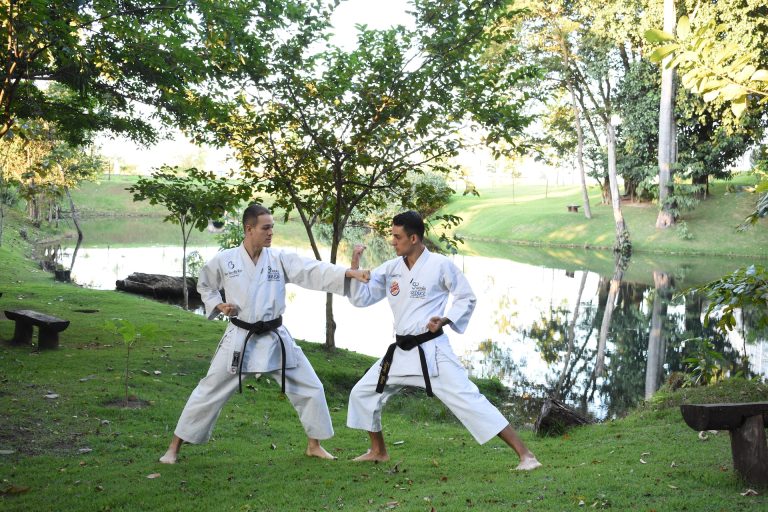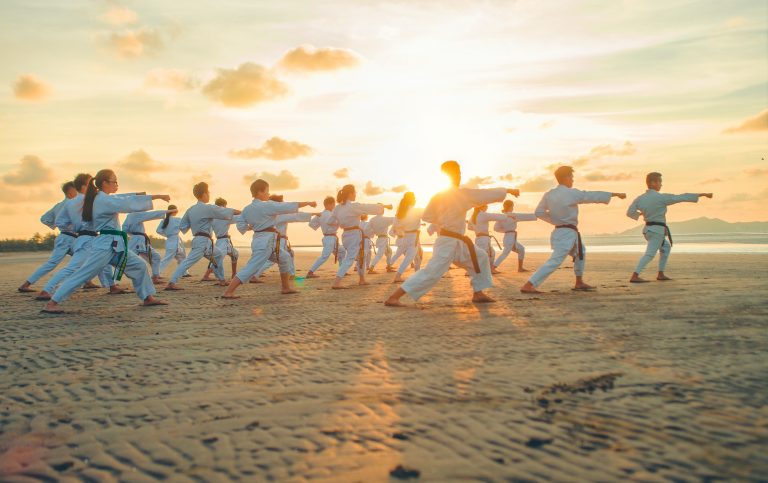Karate-Unterricht für 10-jährige Kinder
Eltern, die nach einer Aktivität für ihre 10-jährigen Kinder suchen, sollten in Erwägung ziehen, sie zu einem Karate-Unterricht anzumelden. Karate bietet viele Vorteile für Kinder jeden Alters, einschließlich körperlicher Fitness, Konzentration und Selbstdisziplin.
Vorteile des Karate-Unterrichts für Kinder
Ein Karate-Unterricht kann Ihrem Kind auf viele Arten zugutekommen. Zunächst einmal fördert Karate körperliche Fitness wie Kraft, Ausdauer und Beweglichkeit. Ihr Kind wird auch lernen, seine Konzentration und Motorik zu verbessern, was ihm auch in der Schule von Vorteil sein kann. Eine weitere wichtige Lektion, die Karate-Unterricht vermittelt, ist Selbstdisziplin und Durchhaltevermögen. Ihr Kind wird lernen, hart zu arbeiten und seine Ziele zu erreichen. Der Unterricht fördert auch das Selbstbewusstsein und das Empfinden von körperlicher Stärke.
Was beinhaltet ein typischer Karate-Unterricht?
Ein typischer Karate-Unterricht umfasst Aufwärmübungen, Techniktraining mit Grundlagen der Karate-Techniken, Partnerübungen und Kumite (Sparring) unter Aufsicht des Lehrers. Die Lehrer werden sicherstellen, dass jeder Schüler das Training entsprechend seinen Fähigkeiten und Grenzen abschließt.
Wie man einen guten Karate-Lehrer findet
Es ist wichtig, einen Karate-Lehrer zu finden, der fachkundig und erfahren ist. Überprüfen Sie Referenzen und suchen Sie Online-Bewertungen, um sicherzustellen, dass der Karate-Lehrer qualifiziert und seriös ist. Stellen Sie sicher, dass der Lehrer die richtigen Zertifizierungen und Lizenzen hat, und überprüfen Sie, ob er Erfahrung im Unterrichten von Kindern hat. Eine gute Möglichkeit, einen Lehrer kennenzulernen, besteht darin, eine Probestunde zu vereinbaren.
Warum ist Karate ein guter Unterricht für 10-jährige Kinder?
Karate ist eine großartige Aktivität für 10-jährige Kinder, da es ihnen hilft, körperlich fit und geistig fokussiert zu bleiben. Der Unterricht fördert auch soziale Fähigkeiten wie Zusammenarbeit und Respekt, die sich auch auf die Schule und andere soziale Situationen auswirken können. Karate-Unterricht ist ideal für Kinder, die ein Interesse an Kampfkunst haben oder einfach nach einer neuen Herausforderung suchen.
Fazit
Karate-Unterricht ist eine gute Möglichkeit, Ihrem 10-jährigen Kind körperliche Fitness, Konzentration, Selbstdisziplin und Selbstbewusstsein zu vermitteln. Es ist wichtig, einen qualifizierten Lehrer zu finden und sicherzustellen, dass das Kind Interesse an der Aktivität hat. Karate-Unterricht kann eine spaßige und spannende Herausforderung für Kinder jeden Alters sein.
FAQs about Karate Lessons for 10-Year-Old Kids
Karate is a popular martial arts form that has been practiced for hundreds of years. It is a great way to improve fitness, develop self-defense skills, and build self-confidence. Parents who are looking to enroll their 10-year-old child in karate lessons may have several questions about what to expect. In this blog post, we answer some of the most frequently asked questions about karate lessons for 10-year-old kids.
1. Is karate safe for a 10-year-old?
Yes, karate is safe for 10-year-old children. Karate is a highly controlled sport, and the instructors take great care to ensure that all participants follow the rules and use the correct techniques. However, as with any physical activity, there is always a risk of injury. It is important for parents to choose a reputable karate school and ensure that their child wears the appropriate safety gear, including a mouthguard and protective pads.
2. What are the benefits of karate for a 10-year-old?
Karate has many benefits for 10-year-old children. It is a great way to improve their fitness and coordination, develop self-defense skills, and build self-confidence. Karate also teaches discipline, respect, and focus, which can be applied to all areas of a child’s life.
3. What should my child wear to karate lessons?
Typically, kids should wear a karate uniform, or gi, to karate lessons. The uniform consists of pants and a jacket, which are typically white, although some schools may have different uniform colors. Some schools may also allow kids to wear shorts or leggings and a t-shirt for the first few lessons until they purchase a uniform. It is best to check with your child’s karate school for specific uniform requirements.
4. How often should my child attend karate lessons?
The frequency of karate lessons may depend on the school and the program. Some schools may offer classes once a week, while others may offer more frequent classes. It is important for parents to choose a schedule that works for their child and fits into their family’s routine. Consistency is key, so it is important that children attend their lessons regularly.
5. What are the different levels in karate?
Karate typically has several levels, which are often represented by different colored belts. Beginners start at the white belt level and progress through several other levels, such as yellow, orange, green, blue, and brown belts, before eventually earning a black belt. Each level requires demonstration of specific skills and techniques, and the requirements may vary slightly between schools.
6. Is there a risk of my child developing aggressive behavior from karate?
No, karate does not cause aggressive behavior in children. In fact, karate is often used as a way to channel children’s energy in a positive way and teach them valuable life skills. Karate schools often teach respect, discipline, and self-control, which can help children develop a sense of responsibility and self-discipline.
7. Can my child compete in karate tournaments?
Yes, many karate schools offer competition opportunities for their students. Competitions may include sparring, kata, and other events. However, competition is not mandatory and some children may prefer to focus on learning the techniques without competing.
8. How long does it take to earn a black belt in karate?
The time it takes to earn a black belt in karate can vary depending on the individual and the school’s requirements. Some schools may offer accelerated programs that allow students to advance more quickly, while others may require several years of consistent practice before earning a black belt. On average, it may take 3-5 years to earn a black belt in karate.
9. How can I help my child practice karate at home?
Parents can help their child practice karate at home by providing a safe and appropriate practice space, helping them memorize techniques and drills, and encouraging them to practice consistently. It is also important to reinforce the values of discipline, focus, and respect that are taught in karate classes.
10. What should I look for in a karate school?
When choosing a karate school for your child, it is important to look for a reputable and experienced school that emphasizes safety and proper technique. Consider factors such as the instructor’s qualifications and teaching style, the culture and atmosphere of the school, and the opportunities for advancement and competition. It is also a good idea to read reviews and talk to other parents to get a sense of the school’s reputation.
Conclusion
Karate can be a great activity for 10-year-old children, offering many physical and mental benefits. By addressing some of the most commonly asked questions about karate lessons for kids, we hope this blog post has provided a helpful guide for parents who are considering enrolling their child in karate classes. Remember to choose a reputable school, ensure proper safety gear, and encourage consistent practice to get the most out of the karate experience.
Inhaltsverzeichnis






